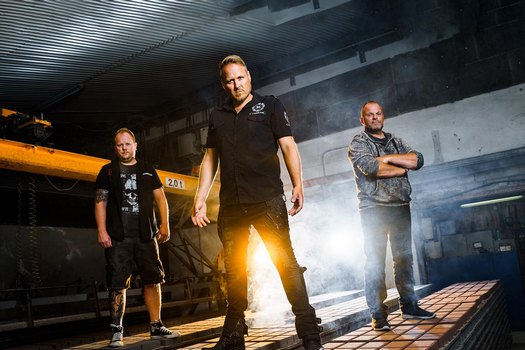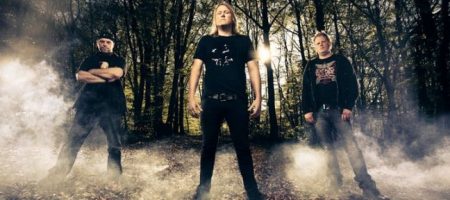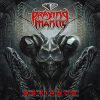Communic – Leaving a Legacy
Wednesday, 23rd December 2020
Masters of a moody mix of melodic power and progressive metal that can be heavy and atmospheric/serene all within the same composition, Norwegian trio Communic have often drawn parallels to acts like Nevermore and Psychotic Waltz. Their latest album Hiding from the World contains another hour of intense music – injecting all sides of the group from softer acoustic guitars and calmer, low register melodies on through to crushing electric riffs and the occasional blast beats against some powerful screams and higher octane vocalization from guitarist Oddleif Stensland. We reached out to Oddleif who was happy to fill us in on the new record, the legacy/live your life today themes on the album, the band chemistry and how they’ve remained a trio together since the start, as well as what fatherhood has changed for his outlook on music.
Dead Rhetoric: Hiding from the World is the newest Communic record – the sixth studio album. You went about the development and fleshing out the songs over two years with a mixture of individual composing and then face to face fleshing out material. How do you believe this combination of approaches worked in the long run to reach a satisfying final effort for this set of songs?
Oddleif Stensland: It’s a good question, because normally when I write songs, I just write stuff and I put it into an archive of items, collecting things. I have some really old stuff, and really new stuff that I don’t use until it’s been lying in the archives to mature over some time. When we started to work on something, putting it together, I’m sitting down and finding out what direction and songs to start with. When I have the first song, and I think the first song this time was “Hiding from the World”. From there I look into the stuff that I have and the feeling that I’m looking for. I have a lot of stuff just waiting to be used, to be put into an album. I write a lot of stuff that doesn’t fit into Communic as well, but maybe later on when I show the other guys and they put some of their influences into it, it suddenly changes and works into a Communic song in the end.
Especially the last song on this album “Forgotten”, there was a lot of those ideas that I never thought would be a Communic song, the acoustic guitar parts I recorded maybe for a solo album. When I showed it to the guys, we worked on it and it changed into a Communic song. That is what I like about working on songs with these guys, we put all our views into my basic ideas, and then together we shape it into a song together. I have four or five albums lying around still waiting in bits and places.
Also for the lyrics, I have a lot of half-finished stuff lying around. Suddenly two of them meld together and it works. That’s my approach when it comes to writing songs. There is never one complete song, the maturation lies in the computer as demos and suddenly one idea fits within another and then we have a song, and before you know it we have an album in the end.
Dead Rhetoric: Did it surprise you that Tor would incorporate some blast beats on this record?
Stensland: No, because he is a more extreme metal drummer than most people think about when people listen to him in Communic. And maybe that is because we have held him back a little bit. This just tells us and the listeners that we really have no rules, we are open to do whatever we feel that we want to do because we don’t care! (laughs). We want to follow what we want to do, and those blast parts ended up on two songs. It was up for discussion when we were rehearsing them, but in the end we felt this fits. The opposite of the calm and mellow parts, it gives this a different dimension. I can’t say that I want this on every Communic album, we had that discussion on how much and how little, and Tor really wanted to incorporate this. As long as it fits the song and we agree on it. We are a three-piece band, so it’s easy to agree on stuff like that. If you are alone on thinking on this and the other two guys say no, then we leave it and think about it later. Deciding on things, everyone needs to be into it. We always have these discussions on direction, but we try not to be bounded by rules. We want to have things brutal if need be, but also quiet if possible, the dynamic build up in the songs is important.
Dead Rhetoric: You write about leaving a legacy and that life can end tomorrow being a driver to many of the themes of the record. Can you elaborate on some specific stories you got across, and what do you consider your legacy to be with Communic to this point in your career?
Stensland: Yes, you are right about the topic and the ideas that I was working on behind the songs. I’ve been interested in that kind of legacy, that people don’t recognize what we do or what we are into until we are gone or dead in a way. It started with me thinking about all those old artists and painters when they were alive they were really poor and didn’t really have anything. When they passed away, their art was really valuable and other people gained the reputation and money for their art. It’s like that in music as well, when people pass away people suddenly understand what they’ve lost. This person or artist has left this legacy, and if you write a book it will be there forever, in a library for generations to have read it. That’s how it is with music, when you release it hopefully it will be there for a long time after we are gone and others will have the chance to listen to it.
That was a huge force behind writing these songs. Of course it’s personal as well, my life and life experience and what I feel I’ve left behind. As well as things I haven’t done yet, and I need to hurry up (laughs). Because you never know how long we are here. I’m talking a little bit about legacy and stuff like that.
Dead Rhetoric: Can you tell us about the video shoot for the title track – as it has a darker and spacey vibe against the performance aspects for the band? Do you enjoy the visual medium to express the band’s music in that avenue which obviously differs from the record and live performances?
Stensland: Yes, I think it’s interesting to explore these kinds of things. With that being said, I also find it a bit challenging because you have to deliver yourself or act in a way, perform out of your comfort zone. When you are on the stage or in the studio, you are also crossing that comfort zone if you are in the studio with a producer, you need to know your parts and want to be prepared. When you get a camera in your face, it’s a mix of everything different.
We had some problems with the video shoots that we wanted to do. We had a few different visions on what we wanted to do, we had some people that were coming over to film it but this COVID situation made travel difficult. The guy who was going to shoot it couldn’t travel to the place where we were going to film it, we had a week until the deadline. So everything was in a hurry, and we ended up filming this ourselves in the studio and we used some green screens and smoke to make this happen. The day after we went to this old bunker from the war and it’s still in the mountain, you can enter into the mountain and follow these caves to come out again on the other side of the mountain. It’s a deep cave system that you can go into and hide from the world. We were looking for that feeling of going inside with a little light in the darkness, some torches to light up the walls.
It ended up cool but we had to do it ourselves and we are not really directors for movies. We had a guy at the end who ended up editing and pulling stuff together, special effects and stuff. We had a big performance planned video set up in a bigger hall with lighting and professional film folks, but that didn’t happen. The first lyric video we released, “My Temple of Pride”, that almost ended up being shot by ourselves to be put together by another guy.
Dead Rhetoric: You’ve established a tradition of exploring longer song structures and arrangements in the band. Do you consider it a challenge to come up with something powerful and progressive while also retaining melodic, catchy, or hook elements when you write and develop songs that can average between seven to ten-minutes?
Stensland: It’s always challenging, and we always try to challenge ourselves to take it to the next level without ruining what we have already established. We’ve found our sound, all the way back into the beginning. Dramatic, dynamic build ups, time changes with different moods – that is something that we are looking for. This time we tried to make it a little bit easier, not trying to over-complicate things. A lot of the emotions and feelings that I feel, I needed to get the lyrics out, were complicated enough – so if I made the music more complicated it would ruin the aspect that I was looking for, communicating with the words and the melodies.
It’s a strange thing, but getting the songs together – when I write the songs, they are not that long, maybe four or five minutes of ideas. But I like the way of going to the rehearsal room with the other guys – and then we arrange the songs together, in the room with the band playing, cranking the amps and hearing the real drums. Doing it in the flesh with the three of us, that’s where the magic is happening. With my four minutes of ideas, those guys bring in their ideas because I don’t show them what I have in mind when it comes to drums and bass. I want to get their influences as well. When we add all those elements, things just build upon the other stuff we have, and it turns out as a long song. Sometimes we have longer lyrics and there is a story you need to tell, you can’t end it before it’s done.
And it’s not that easy for the listener. Our music is something that people need to sit down and absorb it a little bit to get into. But then there will be some treasures they’ll hear, I hope.
Dead Rhetoric: Has fatherhood changed your perspective and goals when it comes to your career and what you want to achieve?
Stensland: Yeah, you know I have three kids and they are still pretty small. My youngest is six years old. The biggest difference is the difficulties to find time to get together and be together as a band. Touring is not something… we haven’t been the most touring or active band in that regard, if we are going on a longer tour it would have to make sense for the economic part of it and also our daytime jobs. We don’t live off this band. Having a family that needs to be taken care of, and makes you a little bit… it’s not as easy to just go away. For me being home now while the kids are small is really valuable. I think the most difficult part of it is dedicating time to do (music). If it’s fun, we will continue to do this. If it’s a drag or stressful, we will probably do something else – or just not release music. If we didn’t have a record company, we would probably put this on YouTube for fun and share it. You never know where this stuff is going to happen.
Dead Rhetoric: Where has Communic been successful in keeping the three-piece lineup together since 2003 compared to other bands where there are usually numerous member shifts? Is it about musical chemistry and genuine respect for each person as a person that helps keep the ship on course so to speak?
Stensland: Yes, we are quite proud about being together as the same members since we started this band. There aren’t that many bands out there that can say the same thing. I think it’s like you said, about respect. We have had our problems in the band, and several occasions where it just would have been easier to continue with somebody else, including myself. Back in 2009-10, I was ready to quit myself and I had a rough time. I told the guys that you have to continue without me, I was so done. Tor our drummer had the same kind of problems. But all the problems that we have had, bumps in the road for Communic, has not been band related or the direction we are going in. It has been something on the outside that has made some problems for us personally.
We show ourselves respect, giving time to recover, and get back on track. I think it’s been cool we have managed to accomplish that. We have had some longer breaks… we have met up and played together in the room, and had social get-togethers. We didn’t have the focus on preparing an album, and it was five or six years after the Payment album to collect ideas for the next album. We needed to do this to be able to continue. Giving up is maybe too easy, and that comes back to friendships and relationships and stuff like that. It’s easy to continue with somebody else, and it will take you to a different level. We haven’t had any big tours that we had to do – if we had a month of touring, and one of the guys didn’t want to do it, we would have to make a replacement. We played ProgPower in Atlanta, and we had to travel to play that gig without Erik because he wasn’t allowed in America. He was too slow on applying for the Visa. We had a friend step in, he was learning the songs on the fly, and that was an experience. You do it to get through the things that you have to do, that was just that gig.
Dead Rhetoric: What’s left for Communic or yourself as a musician to accomplish on the bucket list of items you’ve yet to do or achieve?
Stensland: I have told myself many times I’ve done whatever I need to do. I’ve played the biggest festivals, European tours all over, I’ve released albums. I’ve done a lot of good stuff, and the albums I’ve done I can look back at and say this is okay. As long as I feel that there is an urge to create music, I always create music. If I’m sitting there watching television, I always have a guitar within my reach. I have some ideas I always record on my phone. I am a creative person and I have a lot of musical ideas that I need to get out. I work as a graphic designer so I am a creative person. I would have done this anyway. I don’t feel that urge to be a big rock star. I understand that people want to see us play live, and we like to play live as well, but it needs to make sense.
I’m happy with where I am at. It’s good to release new songs and to hear the feedback from people who are listening to our music and like the stuff that we do.


























